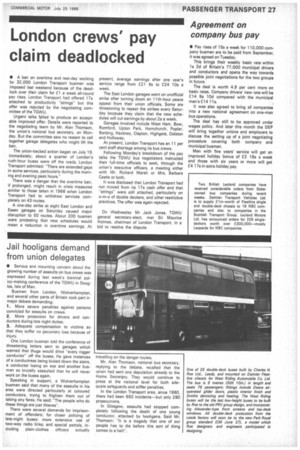London crews' pay claim deadlocked
Page 29

If you've noticed an error in this article please click here to report it so we can fix it.
• A ban on overtime and rest-day working by 32,000 London Transport busmen was imposed last weekend because of the deadlock over their claim for £1 a week all-round pay rises. London Transport had offered 17s attached to productivity "strings" but this offer was rejected by the negotiating committee of the TGWU.
Urgent talks failed to produce an acceptable improved offer. Details were reported to the negotiating team by Mr. Alan Thomson, the union's national bus secretary, on Monday. But the committee saw no reason to call together garage delegates who might lift the ban.
The union-backed action began on July 19. Immediately, about a quarter of London's rush-hour buses were off the roads. London Transport admitted: "There are extended gaps in some services, particularly during the morning and evening peak hours."
There was a danger that the overtime ban, if prolonged, might result in crisis measures similar to those taken in 1966 when London Transport had to withdraw services completely on 43 routes.
A one-day strike at eight East London and Essex garages on Saturday caused major disruption to 50 routes. About 200 busmen were protesting that new schedules would mean a reduction in overtime earnings. At present, average earnings after one year's service range from £21 6s to £24 10s a week.
The East London garages went on unofficial strike after turning down an 11th-hour peace appeal from their union officials. Some are threatening to repeat the strikes every Saturday because they claim that the new schedules will cut earnings by about 2s a week.
Garages involved include West Ham, Bow, Romford, Upton Park, Hornchurch, Poplar, Barking, Hackney, Clapton, Highgate, Dalston and Holloway.
At present, London Transport has an 11 per cent staff shortage among its bus crews.
Following Monday's breakdown of the pay talks the TGWU bus negotiators instructed their full-time officials to seek, through the union's executive officers, a meeting either with Mr. Richard Marsh or Mrs. Barbara Castle or both.
It was disclosed that London Transport had not moved from its 17s cash offer and that "strings" were still attached, particularly on o-m-o of double deckers, and other restrictive practices. The offer was again rejected.
















































































































